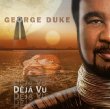Jazz-fusion has been the one genre that has been largely ignored when artists reach back into the musical past. That is an unfortunate oversight that is now being rectified by several albums, must notably Déjà vu, George Duke's aptly named new record, scheduled for release in August.
Déjà vu is an appropriate title for this new album because Duke was a part of the early and mid-1970s fusion wave before he became a funk impresario later in the decade and into the 1980s. Fusion had a tougher sales job than the contemporary (or smooth) jazz that followed it. Fusion artists used the electric and electronic instruments associated with rock and funk music to play jazz music. They fused rock and funk with jazz, but the jazz was always paramount.
Jazz-fusion has been the one genre that has been largely ignored when artists reach back into the musical past. That is an unfortunate oversight that is now being rectified by several albums, must notably Déjà vu, George Duke's aptly named new record, scheduled for release in August.
Déjà vu is an appropriate title for this new album because Duke was a part of the early and mid-1970s fusion wave before he became a funk impresario later in the decade and into the 1980s. Fusion had a tougher sales job than the contemporary (or smooth) jazz that followed it. Fusion artists used the electric and electronic instruments associated with rock and funk music to play jazz music. They fused rock and funk with jazz, but the jazz was always paramount.
Black music in the 1970s was extremely diverse. Artists such as Duke looked to find ways to incorporate the musical movements from previous decades into their music, and fusion was a part of that movement. It was experimental, free and ground breaking, and it is not surprising that artists such as Duke would want to return to this genre.
Duke and other artists who have returned to fusion picked a perfect time to do so. The record industry is in a state of flux, and the powers that might have pressured artists - even one as talented and respected as Duke - to stick to the beaten path don't have the same level of power, and the Cleveland based Heads Up label wisely gave Duke the artistic autonomy to move in his own direction. Duke used that autonomy to create a record that sounds like it could have been made in 1974 yet feels more cutting edge than nearly anything else out there.
Duke fuses jazz with funk, southern soul, blues and rock. He does this while providing food for those who have been fans of his ballad work going back to the days of "Sweet Baby" and "No Rhyme, No Reason." Déjà vu sports ballads, such as "Bring Me Joy" and "Come to Me Now," that give Duke a chance to showcase his top rate piano and keyboard skills.
Those who recalls that Duke also played with way-out-there cats like Jean Luc-Ponty and Frank Zappa won't go away disappointed when they hear tracks like "Ripple In Time," that combine jazz and funk with atmospheric keyboards that might remind some of Miles Davis' fusion work. The blues and soul folk will gravitate to head nodders like "You Touch My Brain" while the funky people will hear "Oh Really?" and scream heck yeah!
Déjà vu will definitely be a step up for those fed a steady diet of elevator music instrumental remakes of R&B songs that comprise too much of the contemporary jazz play lists these days. Thankfully, more and more of these talented artists have decided to become more adventurous. With Déjà vu, Duke proves that sometimes history repeating itself is a good thing. Recommended.
By Howard Dukes

